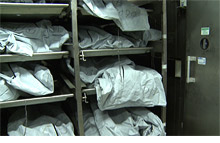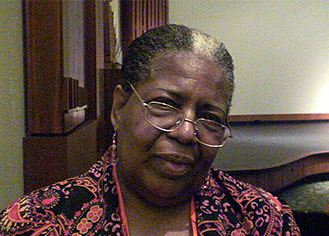Detroit: Too broke to bury their dead
Money to bury Detroit's poor has dried up, forcing struggling families to abandon their loved ones in the morgue freezer.
 |
| Unclaimed bodies piling up in the Detroit morgue. |
DETROIT (CNNMoney.com) -- At 1300 E. Warren St., you can smell the plight of Detroit.
Inside the Wayne County morgue in midtown Detroit, 67 bodies are piled up, unclaimed, in the freezing temperatures. Neither the families nor the county can afford to bury the corpses. So they stack up inside the freezer.
Albert Samuels, chief investigator for the morgue, said he has never seen anything like it during his 13 years on the job. "Some people don't come forward even though they know the people are here," said the former Detroit cop. "They don't have the money."
Lifelong Detroit residents Darrell and Cheryl Vickers understand this firsthand. On a chilly September morning they had to visit the freezer to identify the body of Darrell's aunt, Nancy Graham -- and say their goodbyes.
The couple, already financially strained, don't have the $695 needed to cremate her. Other family members, mostly in Florida, don't have the means to contribute, either. In fact, when Darrell's grandmother passed recently, his father paid for the cremation on a credit card -- at 21% interest.
So the Vickers had to leave their aunt behind. Body number 67.
"It's devastating to a family not to be able to take care of their own," said Darrell. "But there's really no way to come up with that kind of cash in today's society. There's just no way."
The number of unclaimed corpses at the Wayne County morgue is at a record high, having tripled since 2000. The reason for the pile-up is twofold: One, unemployment in the area is approaching 28%, and many people, like the Vickers, can't afford last rites; two, the county's $21,000 annual budget to bury unclaimed bodies ran out in June.
"One way we look back at a culture is how they dispose of their dead," said the county's chief medical examiner, Carl Schmidt, who has been in his position for 15 years. "We see people here that society was not taking care of before they died -- and society is having difficulty taking care of them after they are dead."
Detroit is not alone. The Los Angeles coroner's office said it, too, has seen an increase in the number of bodies abandoned. That's not surprising at a time when unemployment tops 10% in many cities and the median cost of a funeral in America hovers around $7,000. Cremation can cost $2,000.
This is an issue of concern, said the Detroit mayor's office, but the city can't afford to offer any assistance. "The failure, through inability or choice, to bury the deceased is a reflection of the economic conditions that have arrested this region, where people are now forced to make emotionally compromised choices," said a spokesman in a prepared statement.
The state, however, does have some funds available to assist with burial costs. For fiscal year 2009, Michigan allocated $4.9 million for assistance, and of that, approximately $135,500 remains. Those in need of assistance can find grant applications at Michigan Department of Human Services offices, most funeral homes, and at Michigan.gov/dhs.
The Vickers did not know about the funds until CNNMoney notified them. But, fortunately, they were eventually able to scrape together the $695 and will be able to cremate their aunt with help from Social Security, social services and their aunt's church.
The way Darrell sees it, the stimulus package should have helped people in situations like this, rather than to "spark the economy and sell cars. We can't take care of our own when it comes to laying them to rest and letting them rest in peace."
Believe it or not, the Vickers are among the fortunate.
Dozens of other bodies remain, some never identified. And they can't be disposed of until their families come forward or the county's burial fund is replenished when the 2010 budget is approved. There were 66 bodies before Aunt Nancy's, and they'll be interred on a first-arrived-first-buried basis.
"There are many people with sad lives," said Schmidt. "But it is even sadder when even after you are dead, there is no one to pick you up."
And in a town with so much need, Schmidt noted one more cause for concern: The increase in unclaimed bodies is not due to an increase in murders -- though the rate remains high -- but due to natural causes. Schmidt speculated that many of the deceased didn't have health insurance or could no longer afford medication for the chronic medical conditions.
"If anything is a reflection of the economy, that is a reflection of the economy," he said.
But this messy reality is shielded behind the Wayne County morgue's perfectly trimmed hedges and pristine brick walls.
"I feel sadness because I can recall when it [Detroit] was really booming," said investigator Samuels. "I don't think a lot of people are really aware that these types of things are happening in such a wide area." ![]()





